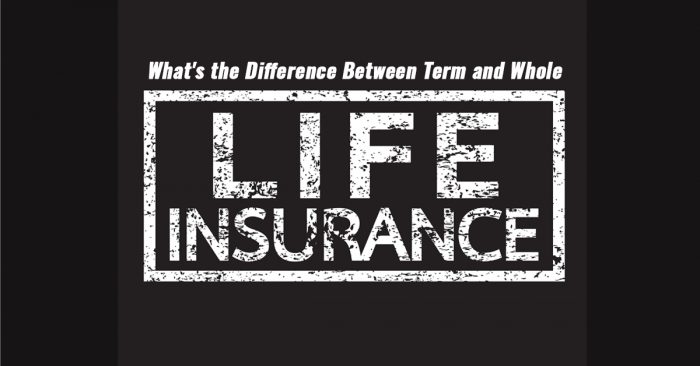What’s the Difference Between Term and Whole Life Insurance?

What’s the Difference Between Term and Whole Life Insurance?
Many of our decisions in life start by choosing one path or another. We can choose to rent the space we live in or buy a home. We can book a flight or drive to our destination. When it comes to life insurance, your path starts by understanding the basic differences between term life insurance and whole life insurance.
Term insurance covers the insured’s life over the course of a specific period. The term may be five years, 20 years, 30 years or anywhere in between. You may purchase a 30-year term life insurance policy to help ensure a mortgage is paid off in the event of a death. A young breadwinner may decide to take out a large amount of term life insurance to protect a young family, ensuring college will be paid for and the family’s lifestyle can continue. One of the biggest benefits of term insurance is that it is relatively inexpensive to acquire, especially at younger ages. The downside is that term insurance will expire at the end of the term and coverage will cease. There is usually no cash value build-up with a term life insurance policy.
Whole life insurance, or what is sometimes referred to as permanent insurance, will stay in force for as long as premiums are made in a timely manner. While it can be more expensive to purchase than term insurance, it has the added benefit of building up cash value over time. This cash value can be accessed through a policy loan, usually at a very attractive interest rate. The policy may also be “cashed-in” at some future date. The other benefit is that even if the insured were to become sick, even terminally, the policy can’t be canceled. Some families who have a challenge saving money will choose whole life insurance as a form of forced savings.
Generally speaking, term insurance is better for those with large financial responsibilities, who need to acquire a significant amount of coverage at an affordable price. This can include those with large incomes or large debts. It is also a way young families can cover mortgage, car, credit card and student loan payments in the event of the death of an insured, while also providing living expenses for those left behind. Whole life is often chosen for those who require less coverage and may also want to build “equity” in a policy.
So what’s right for you? Let’s discuss where you are in life and where you want to go. We can discuss any present life insurance you may have and what can be done to enhance it. Get the life insurance coverage best for your situation. Contact us today.
Do you have questions about your insurance? Find an insurance agent near you with our Agent Finder
Search All Blogs
Search All Blogs
Read More Blogs
Step Back in Time: 7 Small Towns with Unique American Atmospheres
Discover America’s most atmospherically unique small towns.
Beyond the Bar: Customer Service Lessons from the Best Bartenders
Unlock customer service secrets from your favorite bartender.
Your Safety Net Has a Safety Net: Understanding the Life Insurance “Free Look” Period
Discover your life insurance policy’s “free look” period.
From Edsel to Yugo: Three Automotive Flops That Made History
The biggest blunders in automotive history.
Stay or Go? Why Improving Your Current Home Might Be Your Best Move Yet
Love your home, don’t leave it! Discover why improving beats moving.
The Unforgettable Eight: Women Who Captured Our Hearts
Meet the eight women who are loved by all.
Elevate Your Enterprise: 11 Smart Ways to Boost Business Professionalism
Boost your business’s professionalism without breaking the bank.
Lightening the Load: A Guide to Decluttering for Your Loved Ones
Declutter for peace of mind, yours and theirs.
Smart Car Buying: Beyond the Sticker Price
Unlock the hidden costs of car ownership.
6 Simple Steps to Supercharge Your Home Security
Simple, affordable ways to protect your home.









